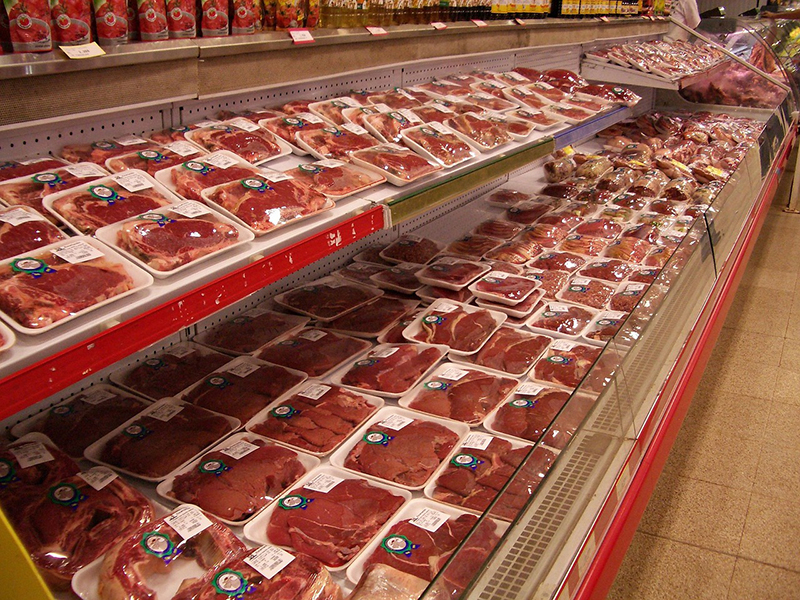A possible threat to the production of kosher meat in Canada has been averted, according to the Centre for Israel and Jewish Affairs (CIJA), which intervened with federal authorities to rectify a situation it described as “urgent.”
The problem arose following changes to the “interpretation” of Canadian Food Inspection Agency (CFIA) regulations concerning the prevention of animal suffering, which, according to CIJA, could have ended shechitah (Jewish ritual slaughter).
The veal production practices of three abattoirs in Ontario and Quebec were brought into question by the CFIA. They collectively supply all of Canada’s kosher veal market and 85 per cent of the U.S. market, said CIJA CEO Shimon Koffler Fogel.
Moreover, he said that it “became clear the ruling would quickly be applied to all abattoirs, threatening the entire range of kosher beef, calf and lamb products.”
The changes came about, at least in part, as a result of the free trade agreement reached between Canada and the European Union last year.
CIJA appealed to Agriculture Minister Lawrence MacAulay, to prevent the federal government from imposing regulations that would make shechitah illegal. A series of meetings and inspections culminated in a site evaluation by senior CFIA officials, CIJA and rabbinical representatives on March 7.
READ: SUPPLY MANAGEMENT LEADS TO KOSHER CHEESE ‘CRISIS’ IN CANADA
Fogel said that, “A clear consensus was reached that confirms shechitah as a humane and approved method of animal slaughter.”
He emphasized that, “CFIA officials were deeply respectful and saw the continued supply of kosher meat as an important part of their own mandate.”
Fogel said that the section on animal welfare in the CFIA manual was at the centre of the matter.
“In particular, the discussion revolved around the criteria used to determine ‘sensibility,’ or more precisely, ‘insensibility’ – that is, at what point does the animal become insensible to pain or stimulus?” he explained.
The basic measurements include such signs as eye movement, tongue control, sounds made, ability to stay upright and breathing rhythm.
In 2014, the CFIA updated its manual and since then, its regulations have become more in line with international standards, notably those outlined in the Comprehensive Economic and Trade Agreement, the free trade agreement between Canada and the EU, which came into force in September.

The idea is to minimize, if not eliminate, animal suffering, said Fogel. “However, in all of the literature – and the CFIA manual itself – there is a recognition that assessment of sensibility is subjective and open to interpretation. That is why inspectors and plant personnel are urged to make their evaluations in the aggregate: taking all of the criteria as a whole.”
In the matter at hand, the criterion of “rhythmic breathing was confused with agonal breathing and triggered some concerns on the part of CFIA officials that animals were being hoisted before the onset of insensibility,” he said.
Veal production was singled out because of anatomical differences between calves and full-grown cattle, Fogel added. “The criteria are less precise in calves, who have not fully developed the musculature of a mature animal. So anomalies in breathing patterns, for example, (may be) present in calves, but not once the animal reaches maturity.”
At the end of 2017, CIJA was contacted by kosher certifying agencies, namely Montreal’s Jewish Community Council (MK) and the Toronto-based Kashruth Council of Canada (COR), as well as a number of U.S. agencies, for its assistance.
At that point, slaughter had been suspended for several days, said Fogel. This was done voluntarily by the plants and not at the behest of the CFIA, he added.
“By the time CIJA intervened, it was clear that there was an urgent need for all the stakeholders – the CFIA, the kashrut agencies and the meat plants – to resolve the issue in a definitive way,” he said.
At no point was this issue a result of any antipathy on the part of the CFIA towards Jewish ritual slaughter.
– Shimon Koffler Fogel
“In the lead-up to Passover, when demand spikes, there was an especially pressing need to resolve the issue and preserve the supply of kosher meat in Canada.”
Fogel stressed that, “It would only have been a question of time, and not much of that, before the concerns that focussed on veal shechitah would extend to all beef products.”
Fogel said that CFIA regulations will be rewritten “to reflect the consensus understanding achieved over the last couple of weeks,” which he is confident will prevent future disruptions at kosher slaughter facilities.
“The interpretation of the criteria were clarified in a way that allows for the continuation of shechitah without any difficulty and all stakeholders are now on the same page with respect to those issues,” he said.
Fogel applauded MacAulay and his staff for their positive response, and praised the CFIA for its attentiveness.
He stressed that, “It is important to underline that at no point was this issue a result of any antipathy on the part of the CFIA towards Jewish ritual slaughter and CIJA discerned no evidence at all of the kind of tension that has motivated some European agencies and countries to challenge the legitimacy of shechitah.”
